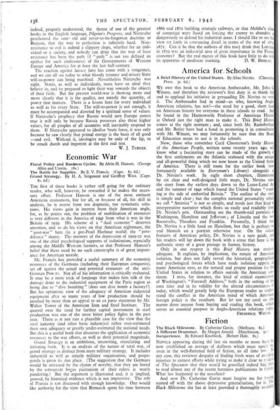Fiction
NOVELS appearing during the last six months or more have by now established an average of dullness which must surely even in the well-flattened field of fiction, an all time low. .10 any case, this reviewer despairs of finding fresh ways of avoiding injustice to earnest efforts while trying to make it clear to readers of The Spectator that they would be gravelled indeed had the; to read almost any of the recent harmless publications in knoll What has happened to the novelists? And now Dr. Catherine Gavin must forgive me for having started off with the above depressive generalisation, for in The Black Milestone she has at least provided a thoroughly readab.,: and topical adventure story, based in probability of character and of action, and having a theme which can hardly fail to interest this island : namely, an invasion raid by the Germans at a lonely point of the coast near Aberdeen. Her story .opens with the landing at Fraserburgh of thirteen Frenchmen, picked up round the fjords after Namsos by the trawler Nancy Bell.' Most of them are in a sorry state ; twelve are Chasseurs Alpins ; the thirteenth, suspect from his first observation, is a Legionnaire. Lieutenant Eugene Berard, of the Chasseurs, wounded and depressed, is to be the hero • of our story ; Paul Rissler, the Legionnaire, its villain. Altogether about one hundred and fifty bewildered and anxious Frenchmen, adrift from Namsos, are landed in the little port, and we arc given benevolent, realistic sketches of reactions between them and their Scottish hosts. The terrible German advance on Paris is in swing ; Belgium has
laid down arms ; and the never-to-be-forgotten anxiety of those weeks of summer is well recreated here in simple terms. Against this background a love-story grows awkwardly and cautiously between the lieutenant of Chasseurs and Christian Baird, twenty- five-year-old daughter of the Manse of Troup, who has spent student days in Paris and is an intelligent, clear-sighted Franco- phile. Against it, too, creeps up the plot of the Legionnaire and his odd, elderly friend, Mynheer van Blieck, who lives in a' lonely house overlooking the Moray Firth.
The German plot develops, uneasily sensed by Christian, Eugene and one or two others ; a skilfully planned midnight raid takes place and the pages in which the startled people of Buchan go out to tackle the invader are really exciting, and full of brave and breathless action, which manages always to keep in character and to seem as probable as it is inspiriting. The passage in which the heroine makes her way against all odds to the kirk and rings the bell will make all readers pray anxiously that in such a situation they may keep their heads one-half as well as Christian Baird. And it is matched by a classic battle waged by Robina, a farmer-widow, and a half-witted farm-hand called Jock, against a party of the invaders. This fight is very moving and brings the tough, eloquent, wild character of Robina to a
fitting climax. The raid is beaten back ; the Navy sweeps down the Firth ; the people bury their • dead and attend to their wounds. The depressed Frenchmen receive their orders and melt away, for Morocco, for France or for General de Gaulle. Eugene decides that his place is in France, with his humiliated people ; but Christian also feels that her place, for the war, is with her people. They pledge their love and decide to wait for each other. It is a good story, full of action, and written with good sense and some sensibility. And the Buchan idiom, though as spoken by Robina it is almost incomprehensible at times, adorns it richly.
There is little to be said of the other two novels. Each has a certain fatiguing naiveté, the one of earnestness, the other of what one must call, I suppose, social comment. Mrs. Arnold deals emotionally and even melodramatically with the doubts of an Anglican clergyman who is eventually able to enter the Roman Church, having been by a convenient tragedy relieved of his troublesome, adorable wife. Mr. Knoblock's smug little heroine has- some unremarkable adventures in London " society," oddly portrayed ; and also among her paternal relatives in a dilapidated



























 Previous page
Previous page